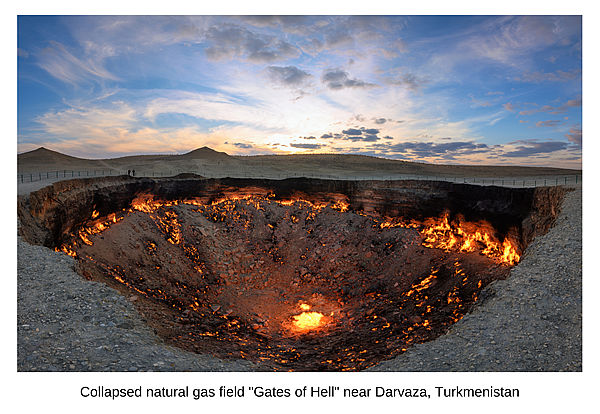 Turkmenistan: The Golden Gateway to the East, Where Ancient Wonders Abound
Turkmenistan: The Golden Gateway to the East, Where Ancient Wonders Abound
Nestled in the heart of Central Asia, T
urkmenistan unfurls like a silk carpet, intricately woven with tales of grand empires, ancient civilizations, and the timeless allure of the Silk Road.
Here, golden deserts kiss the cerulean sky,
ornate minarets reach out to the heavens, and cities built of marble glimmer under the unrelenting sun. Turkmenistan, a largely untrodden path in the world of tourism, is an enigma waiting to be unraveled.
It is a land where history has left its indelible marks in the form of archaeological sites and ancient ruins, narrating stories of an era that once flourished on this terrain.
The country's capital, Ashgabat, is a city like no other. With its grandiose monuments and wide, clean streets lined with immaculate marble buildings, it stands as a testament to Turkmenistan's modern aspirations. Yet, in the city's bazaars and teahouses, one can still find the old world charm that harks back to the Turkmen's nomadic traditions.
The Turkmen landscape, predominantly arid and desert-like, holds within its sandy folds a rugged beauty that is both haunting and captivating. From the echoing silence of the Karakum desert to the fiery depths of the Darvaza Gas Crater, the country's natural wonders inspire awe and wonder.
The cultural tapestry of Turkmenistan is as intriguing as its landscapes. Its people, known for their warm hospitality and strong traditions, offer a fascinating glimpse into a unique way of life that has been shaped by the harsh desert environment, historical events, and rich cultural exchanges along the Silk Road.
So, journey to Turkmenistan, the land where ancient and modern dance in a timeless duet. Step into the echoing silence of its endless deserts, wander through the ruins of civilizations past, and discover a country where history, culture, and nature converge to create an unforgettable tableau.
For a short video introduction of Turkey, click below
Visa Requirements
Most foreign nationals need a visa to enter Turkmenistan. You'll also need a letter of invitation from a tour operator or a host. Always check with the nearest Turkmen embassy or consulate for the most current information.
Currency
The official currency is the Turkmenistan Manat (TMT). Credit cards are not widely accepted outside major hotels, so cash is essential. There are ATMs in larger cities, but they might not accept foreign cards.
Language
The official language is Turkmen. Russian is also widely spoken, and English is understood in some hotels and tourist establishments.
Connectivity
Turkmenistan has one state-run telecommunications company, Altyn Asyr, offering mobile and internet services. SIM cards are available in major cities and can be purchased after providing passport details.
Health and Safety
Medical facilities are limited, particularly outside Ashgabat. Ensure you have comprehensive medical insurance that covers medical evacuation. Turkmenistan is a safe country with low crime rates, but usual travel precautions apply.
Tourist Attractions Not To Be Missed
1. Darvaza Gas Crater (Derweze): Known as the 'Door to Hell', this natural gas field collapsed into a cavernous sinkhole in the 1970s and has been burning ever since. Its fiery glow against the stark desert backdrop creates an eerie, otherworldly spectacle.
2. Ancient Merv (Mary): Once one of the world's greatest cities on the Silk Road, the ruins of Ancient Merv whisper tales of the many civilizations that have risen and fallen here. From the Mausoleum of Sultan Sanjar to the Gyz Gala fortress, the site is a treasure trove of archaeological wonders.
3. Ashgabat: The capital city, famously filled with white marble buildings, offers a range of attractions including the grandiose Independence Monument, the Turkmenbashi Ruhy Mosque, and the bustling Tolkuchka Bazaar.
Last but not least
Here is another trick: Turkmenistan is a predominantly Muslim country, and while it's not as conservative as some of its neighbors, it's still a good idea to dress modestly, particularly when visiting religious sites. Avoid showing too much skin and always respect local customs and traditions.
